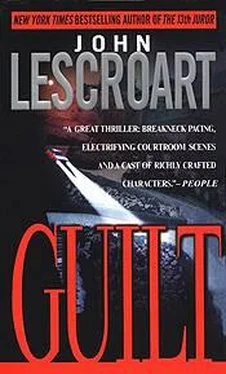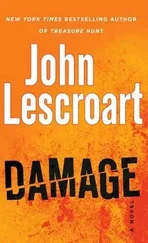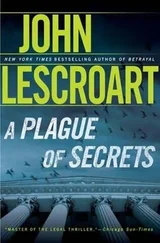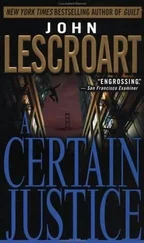John Lescroart - Guilt
Здесь есть возможность читать онлайн «John Lescroart - Guilt» весь текст электронной книги совершенно бесплатно (целиком полную версию без сокращений). В некоторых случаях можно слушать аудио, скачать через торрент в формате fb2 и присутствует краткое содержание. Жанр: Триллер, на английском языке. Описание произведения, (предисловие) а так же отзывы посетителей доступны на портале библиотеки ЛибКат.
- Название:Guilt
- Автор:
- Жанр:
- Год:неизвестен
- ISBN:нет данных
- Рейтинг книги:3 / 5. Голосов: 1
-
Избранное:Добавить в избранное
- Отзывы:
-
Ваша оценка:
- 60
- 1
- 2
- 3
- 4
- 5
Guilt: краткое содержание, описание и аннотация
Предлагаем к чтению аннотацию, описание, краткое содержание или предисловие (зависит от того, что написал сам автор книги «Guilt»). Если вы не нашли необходимую информацию о книге — напишите в комментариях, мы постараемся отыскать её.
Guilt — читать онлайн бесплатно полную книгу (весь текст) целиком
Ниже представлен текст книги, разбитый по страницам. Система сохранения места последней прочитанной страницы, позволяет с удобством читать онлайн бесплатно книгу «Guilt», без необходимости каждый раз заново искать на чём Вы остановились. Поставьте закладку, и сможете в любой момент перейти на страницу, на которой закончили чтение.
Интервал:
Закладка:
'Is that necessary?'
The door opened again and Thieu put out a hand against it. 'Just a minute, please. Police.'
But the door got pushed open anyway. Roughly.
'Sergeant Glitsky!'
Glitsky stopped his recital. He remembered her now, no problem. Stunning in the sepia light, her color high, eyes flashing. 'Ms Carerra,' he said. 'I'm sorry, can I ask you to please wait back inside?'
'No, you can't! This is outrageous!'
Farrell stepped forward. 'Christina…'
She jerked her arm away, faced off on them all. 'What's the matter with you, Sergeant? Can't you see what you're putting this good man through? Look at him. He didn't do anything. Goddamnit, look at him, would you?'
But Glitsky was looking at her.
'Christina, it's all right,' Dooher said.
Thieu had snicked the other cuff on Dooher and now he was advancing on Christina. 'I'm afraid I'm going to have to ask you to get back in there, ma' am. Right now.'
Glitsky said, 'Paul, it's okay.'
'It's not okay!' Christina's hands were clenched. Tears of anger were beginning to gleam in her eyes.'This isn't right. Why are you doing this?'
'Christina,' Dooher repeated. Softly, almost like a lover. 'They can't prove it. It's all right.' Then, to Wes, gently, 'Take care of her, would you?'
Christina looked pleadingly at Dooher. He met her eyes. She started to reach a hand up, but Wes Farrell took it. Some profound energy, unmistakable, flowed between them.
Glitsky saw it, and suddenly knew that the very slim chance that he might in fact be wrong had disappeared. They had inadvertently given him the last piece, the elusive key to the whole puzzle – a motive.
Part Four
CHAPTER THIRTY
The Dooher case had enthralled much of the public and captivated the media, not only because of the bizarre set of facts in the case itself, but because it had so deeply polarized the already Balkan-like factions that made up San Francisco.
Wes Farrell had carefully manipulated the coverage, accusing Glitsky of using Dooher as a pawn in his own campaign for advancement within the police department. There was simply no case against Dooher. It was all political.
Glitsky, abetted by activist feminist prosecutor Amanda Jenkins, was simply trying to make his bones by pushing a high-profile case in front of Police Chief Dan Rigby, who was a rubber stamp for the liberal Mayor Conrad Aiken. At the same time, Glitsky was counting on the support of District Attorney Chris Locke, a black liberal supported by two gay supervisors.
On Dooher's side, he had the Archbishop of San Francisco, most of the city's legal community, a host of independent angry white males, including some very vocal radio personalities.
Dooher was white and male. Stories appeared in which people who had known him (and whom he'd fired) recounted his insensitive remarks about his own lesbian daughter. There were no gay attorneys in the firm he ran. He must be homophobic. No women had made partner in his firm, either. He was on record as being anti-abortion.
In short, Mark Dooher's public defense was that he was a modern-day Dreyfuss – exactly the kind of scapegoat an ambitious liberal zealot like Glitsky would need to bolster his reputation and advance his career. The Sergeant had taken the Lieutenant's exam and, in what was widely viewed (and roundly criticized in certain circles) as another liberal end run to enhance his prestige as a prosecution witness, he had been promoted to Head of Homicide.
Outside Judge Oscar Thomasino's courtroom on the 3rd floor of the Hall of Justice, things were heating up.
Building security had erected a makeshift sawhorse chute through which spectators at the trial would have to pass before they entered the courtroom. At the double doors, a metal detector further slowed ingress. (The metal detector at the front entrance to the Hall had been known to miss the occasional weapon, and Thomasino didn't want to take chances in his courtroom.)
So on this cold and clear Monday morning, the ninth day of December, the hallway outside Department 26 was a microcosm of the city, and it was all but unbridled bedlam.
There had already been a mini-riot between the Veterans of Foreign Wars, who supported Dooher, and the Vietnam Veterans of America, who believed Chas Brown. Seven people had to be restrained by the building cops, and two were removed from the hallway and arrested.
But that hadn't ended it. Their blood up, a couple of hippies from the VVA group waded into a contingent of Vietnamese activists who were there protesting the fact that Dooher wasn't being charged with the Trang or Nguyen murders, both of which had received enormous media attention.
It didn't help that the chute was funneling everyone into the same place.
Inside the courtroom, it wasn't much calmer. The hard wooden theatre-style fold-up seats and all the standing-room area in and around them, were crammed with print and network reporters jockeying for space. Women's rights activists wanted Diane Price's story to be heard. Pro-choice and pro-life advocates sniped at each other across the central aisle. The veterans who'd made it inside weren't getting along much better than they had in the hallway.
And this was merely for the pre-trial motion phase, before jury selection had even begun. Attorneys for both sides went before the Judge and talked about the evidence they would be presenting, about what would be allowed, what barred.
Normally, this was not a public, 'sexy' part of a trial. It was often a lot of legalese and mumbo-jumbo. But if any of the political and social issues that surrounded this trial were going to be part of it, today was when everyone was going to find out.
The Judge hadn't yet entered the courtroom, but the court reporter was at her machine in front of the Bench, the clerk sat with his computer printouts off to the side, and the three bailiffs stood at ease in their uniforms.
At the defense table, Mark Dooher was a study in careful control. He and his attorneys had come into the Hall of Justice and then into the courtroom through the back door to avoid having to confront either the reporters or the crowds demonstrating in the hallways outside. Now Dooher sat, somber and subdued, his hands folded in front of him on the table.
On his right was Wes Farrell, who'd lost his ten extra pounds and abandoned his former air of slovenliness; with his maroon tie and charcoal-gray Brooks Brothers suit, he was every inch the successful lawyer.
On the other side of the defendant sat Christina Carrera, by some accounts the 'other woman' for whom Dooher had killed his wife. This theory seemed to suffer under the burden of inspection – the two had been hounded by reporters nearly constantly for months now and they had spent little or no personal time together. They'd never been caught out at any private tryst. They denied any personal involvement with each other beyond a mutual friendship, respect, and commitment to proving Dooher not guilty.
Christina had only passed her Bar exam two weeks before but, at Dooher's request, had been on his defense team from the beginning. Over Farrell's strenuous objections.
Dooher had sprung the idea on him as they were leaving the Hall of Justice after posting bail. Farrell had laid a hand on his friend's sleeve. 'Let me get this straight. You want Christina Carrera, who hasn't even passed the Bar, to be my second chair in your murder trial?'
'She'll have passed the Bar by the time we go to trial.'
'Okay, so even then, that's your plan?'
'That's it.'
Farrell nodded, appearing to give it serious thought. 'How can I phrase my response so that it's both powerful and unambiguous and yet subtle and sensitive? Ahh, the words are coming to me: are you out of your fucking mind?'
Читать дальшеИнтервал:
Закладка:
Похожие книги на «Guilt»
Представляем Вашему вниманию похожие книги на «Guilt» списком для выбора. Мы отобрали схожую по названию и смыслу литературу в надежде предоставить читателям больше вариантов отыскать новые, интересные, ещё непрочитанные произведения.
Обсуждение, отзывы о книге «Guilt» и просто собственные мнения читателей. Оставьте ваши комментарии, напишите, что Вы думаете о произведении, его смысле или главных героях. Укажите что конкретно понравилось, а что нет, и почему Вы так считаете.












